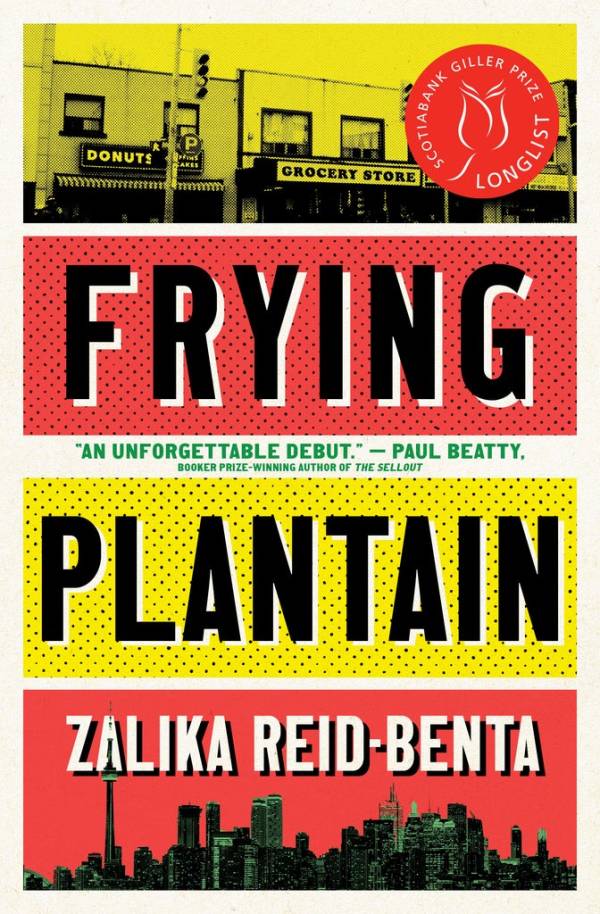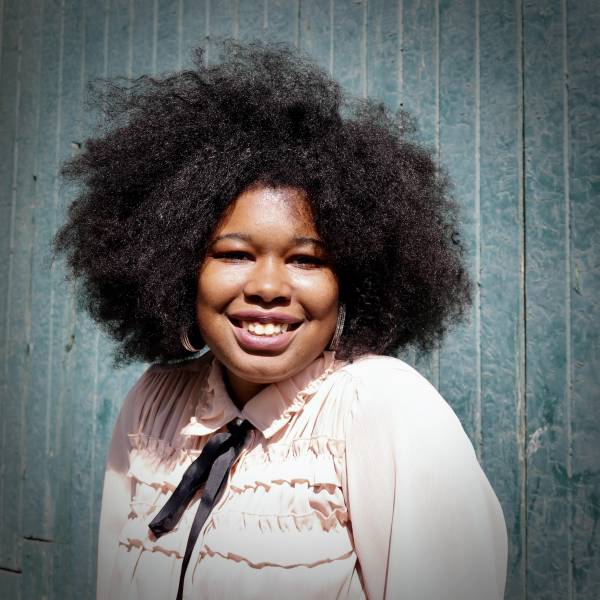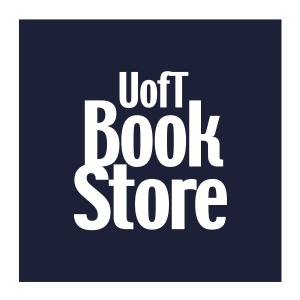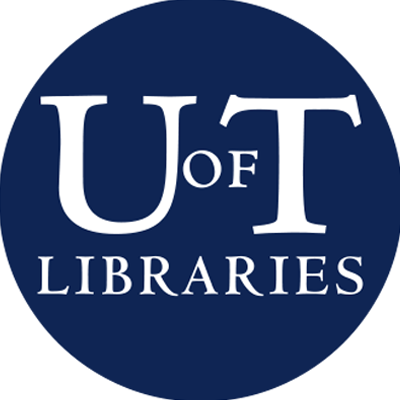
UC Reads: Building Community One Chapter at a Time
UC Reads is a new project for which University College’s students, staff, alumni, and faculty to read and discuss a book written by or focusing on individuals with varied perspectives and/or experiences. The pilot event is presented by University College and UC Books and is meant to celebrate the richness of our community through a common love for literature.

This year, UC Reads' selected book is called Frying Plantain by Zalika Reid-Benta. Interested in reading the book or attending the virtual event on March 22nd? Click the button for more details!
About the book: Set in Toronto’s “Little Jamaica” neighbourhood, Frying Plantain follows one young girl from elementary school to high school graduation in twelve interconnected stories that expose the tensions between mothers and daughters, second-generation Canadians and first-generation cultural expectations, and Black identity and predominantly white society.

Zalika Reid-Benta is a Toronto-based writer whose work has appeared on CBC Books, in TOK: Writing the New Toronto, and in Apogee Journal. In 2011, George Elliott Clarke recommended her as a “Writer to Watch.” She received an M.F.A. in fiction from Columbia University in 2014 and is an alumnus of the 2017 Banff Writing Studio. She completed a double major in English Literature and Cinema and a minor in Caribbean Studies at University of Toronto’s Victoria College. She also studied Creative Writing at U of T’s School of Continuing Studies. She is currently working on a young-adult fantasy novel drawing inspiration from Jamaican folklore and Akan spirituality.
Accessing the Selected Book
Need a copy of the selected book for UC Reads 2022? We have several options available to all those who register.

Purchase a copy of Frying Plantain by Zalika Reid-Benta using discount code UCREADS for 25% off the regular priced books at the U of T Bookstore.

This option is available to current students, faculty, and staff. Simply visit U of T Libraries and search Frying Plantain by Zalika Reid-Benta. Please note that this link to the catalogue shows the copies at various U of T libraries.

If you have a UTORid, this could be a great option for you! Simply visit Overdrive and follow the instructions to borrow a digital copy of Frying Plantain by Zalika Reid-Benta.

Shop Local
Support local by purchasing a copy of Frying Plantain by Zalika Reid-Benta from any number of local bookstores, like A Different Booklist.
Interested in starting a book club?
We invite UC alum to connect with one another through small group book clubs. If this is something that you are interested in hosting in advance of the event on March 22nd, be sure to check out some of our helpful tips and questions below!
-
How to Run Your Own Online Book Club
Host a Meeting:
- Decide how your group will meet (e.g., face-to-face online chat, such as Zoom; discussion forum with comments, such as Skype Discussion Forums)
- Sign up for a free account on one of these sites and invite your group members to participate
- Also consider creating a group where your members can chat via messages at any time (e.g., WhatsApp).
- Get started!
Facilitate the Discussion:
- Choose one member to lead book club discussions or rotate this role among club members
- Ask the group one question at a time. (We’ll provide a list of questions to use, but you can create your own.)
- Use a prompt (prop) related to the story to stimulate insights about the story. For example, use a map, an item of clothing or a piece of music.
- Pick a specific passage from the book—a description, an idea, a line of dialogue—and request comments. (Consider how a passage reflects a character...or the work's central meaning...or members' lives or personal beliefs.)
- Choose a primary character and ask members for comment. (For example, consider their character traits, motivations or impact on the story.)
Tips for Successful Book Discussions:
- Avoid the words "like" and “dislike to prevent members from feeling defensive. Focus, instead, on your own feelings as you read the book.
- Support your views by using specific passages from the book as evidence. This literary analysis technique is called “close reading.”
- Prepare by taking notes as you read. Jot down interesting passages: something that strikes you or, that you don't understand. Bring your notes to the meeting.
-
General Book Club Questions
General Questions
- What was your favorite part of the book?
- What was your least favorite?
- Did your opinion of the book change as you read it? What thoughts did you have about the book after finishing it? Did these differ from any initial thoughts or impressions that you had when you started reading the book?
- What do you think are some of the main themes of the book? How were these themes brought to life?
- What do you feel is the main takeaway from the book?
- Which short story (or chapter) was your favourite, and why?
- What new things did you learn from the book?
- Did the book change your opinions or ideas about anything?
- How did the book make you feel? (Eg amused, upset, bored, angry, intrigued?) Which scene prompted the most emotional reaction for you?
- Were there any parts of the book that evoked strong emotions or a strong reaction (e.g., laughter, shock, sadness, nostalgia, etc.) when you read them?
- Do you think you'll remember the book in a few months or years?
- Are there lingering questions from the book you're still thinking about?
- Did this book remind you of any other books?
- Who do you most want to read this book?
- What did you think of the cover design? Do you have any ideas for other designs?
- If you were making a playlist for the book, what would it include?
Title-Related Questions
- What do you think is the significance of the book’s title?
- Why do you think that this title was chosen for the book?
- Do you think that the book’s title works in relation to the book's contents?
- If you could give the book a new title, what would it be?
Writing-Related Questions
- Are there any passages or quotations that you highlighted or bookmarked? If so, which passages are these, and why did they stand out to you?
- Share a favourite quote from the book: why did this one stand out?
- What did you think of the writing style? Are there any standout sentences or passages?
- Did you notice any recurring symbols or motifs, and if so, why do you think they were significant?
- Did you reread any passages? If so, which ones?
- Did the book grab you immediately, or did it take some time to get into it?
- Which scene has stuck with you the most?
Plot-Related Questions
- What was the most pivotal moment in the narrative? How did it make you feel?
- Were there any surprises in how the story unfolded?
- Were there any plot twists that you liked? Or disliked?
- What are your thoughts on the book's structure? Did it serve the story well?
- What did you think of the ending? Were you satisfied? Disappointed? Is anything left ambiguous or unresolved? Is there anything more you wanted to know?
- Did the book seem realistic?
- Did the plot proceed in a way that felt natural? Or did you feel manipulated by the storyline?
- Do you have any lingering questions about the plot?
- Which event in the book was most similar to something you’ve personally experienced?
Questions Related to the Setting
- When and where was the book set? How important was the setting to the book? Could it have taken place anywhere, at any time?
- How would the book have played out differently in a different time and/or place?
- How did the setting impact the story? Would you want to read more books set in that world?
- Are these places in the book that you know?
- Are there locations that you would like to visit?
Questions Related to the Characters
- Did the characters seem believable? Did they remind you of anyone?
- Which characters did you like best? Which did you like least?
- Which character did you relate to, or empathize with, the most?
- Did your opinion of any of the characters change throughout the story?
- If the story could be told from another character’s point-of-view, who would you choose? Why?
- Did the characters undergo change by the end of the book? Did your opinion of them change?
- What were the power dynamics between the characters? How did these affect their interactions?
- Did the way the characters see themselves differ from how others see them?
- Were there times when you disagreed about a character’s actions? What would you have done differently?
- If you had to trade places with one character, who would it be?
- Which character in the book would you most like to meet?
- Were any of the characters like people you already know? Did that affect your perception of the character?
- Guess the characters' zodiac signs.
- What do you think happens to the characters after the book's official ending?
- Are there any characters you'd like to deliver a lecture to? If so, who? What would you say?
- If you were making a movie of this book, who would you cast?
Questions Related to the Author
- What do you think the author’s purpose was in writing this book? What ideas do you think they trying to get across?
- If you could ask the author anything, what would it be?
-
Questions Specific to Frying Plantain by Zalika Reid-Benta
Title-Related Questions
- The title of Frying Plantain comes from the last story in the book. Do you think that this was a good choice for the book as a whole? Were there any other story titles that would have been good title for the book? What other title might have worked for the book as a whole?
Questions Related to the Characters
- What is the main narrative perspective of the book? How is this perspective disrupted (e.g., the shift in narration that occurs in “Inspection”)? How does narration affect meaning?
- Kara’s perspective on the city is that of a Black, immigrant young woman. How does her perspective shape her understanding and relation to the city? How do race and /or racism infuse Frying Plantain?
- In the early stories Kara is in primary school, and by the end she has entered university. Does she change over time?
- What kind of family relationships are depicted in Frying Plantain? Do these relations resonate with your own or with those of people you know?
- How important are friends to Kara Davis'? What role do they play in her life?
Questions Related to the Structure
- Frying Plantain is a compilation of short stories. Do you believe that the stories in the book depend on one another for meaning, or do you think they could be stand-alone stories (that are read in isolation of one another)?
- Did you notice any interesting techniques that the author uses to tie these stories together (e.g., a recurring theme or motif, narrative techniques, imagery, etc.)?
- Did you find the interlinking of short stories effective? How does this differ from a more conventional novel?
Questions About the Theme
- What role does food play in Frying Plantain? Does it resonate with your own experiences with food?
- What role does storytelling play in the book (e.g., characters telling stories: Kara’s schoolyard stories in “Pig Head” or Nana/Verna’s stories about her nickname in “Fiah Kitty”)?
- What are some references to popular culture in the book that you found particularly interesting?
- Kara Davis’ family immigrated to Canada from Jamaica. How does immigration feature in Frying Plantain?
- Kara Davis' attends several schools across the stories. What is the importance of school and schooling in Frying Plantain? What is the importance of a university education?
- Clothing and self-presentation get a lot of attention in Frying Plantain. Why do they matter, and to whom?
- What is the economic situation of Kara and her mother? How does this factor into their sense of self, family relations, and place in the city?
Questions Related to the Setting
- What role does place play in the book? How does place (or physical space) inform the story?
- What are the various places (within Toronto and outside of Toronto) that are mentioned in the book?
- Are there any places that you felt were integral to the telling of the overall narrative (or individual stories)?
- How does Kara’s movement from one place to another affect her character development?
- Do you think that place impacts the other characters in the book? If so, how?
- How does place affect or create a sense of community?
- Are there any places or landmarks that are mentioned in this book with which you’re familiar; how did this affect your experience reading this book?
- Have you encountered these urban places depicted in other fiction writing, or other forms of media (poetry, film, music)?
- Frying Plantain is set in the late 1990s / early 2000s. What clues about the time period are included in the novel? Does this seem like a different time from the present? Does the city seem different in the present?
Questions Related to the Author
- If you had the opportunity to ask Zalika Reid-Benta a question or two about the book, what would you ask her?